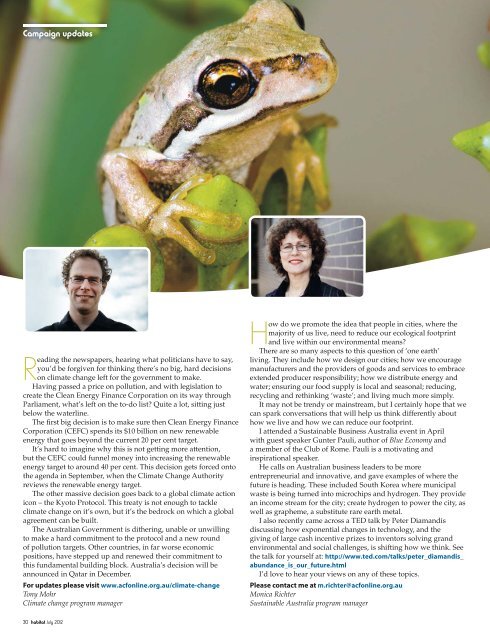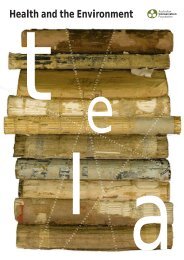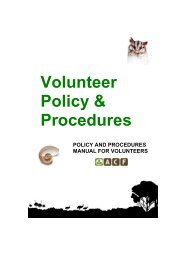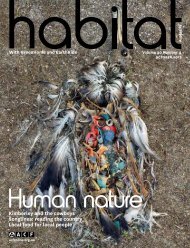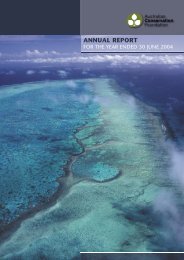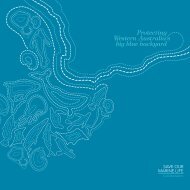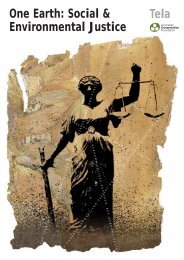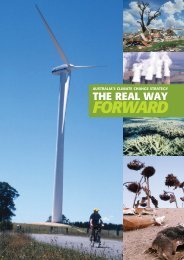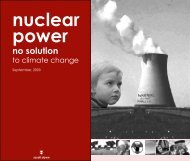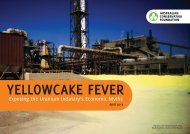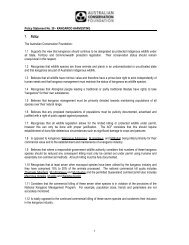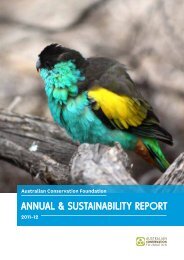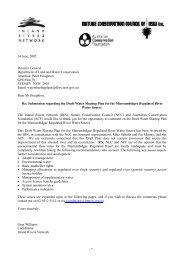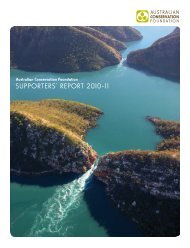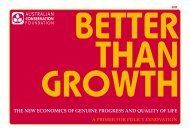habitat July 2012 - Australian Conservation Foundation
habitat July 2012 - Australian Conservation Foundation
habitat July 2012 - Australian Conservation Foundation
Create successful ePaper yourself
Turn your PDF publications into a flip-book with our unique Google optimized e-Paper software.
Campaign updates<br />
Reading the newspapers, hearing what politicians have to say,<br />
you’d be forgiven for thinking there’s no big, hard decisions<br />
on climate change left for the government to make.<br />
Having passed a price on pollution, and with legislation to<br />
create the Clean Energy Finance Corporation on its way through<br />
Parliament, what’s left on the to-do list? Quite a lot, sitting just<br />
below the waterline.<br />
The first big decision is to make sure then Clean Energy Finance<br />
Corporation (CEFC) spends its $10 billion on new renewable<br />
energy that goes beyond the current 20 per cent target.<br />
It’s hard to imagine why this is not getting more attention,<br />
but the CEFC could funnel money into increasing the renewable<br />
energy target to around 40 per cent. This decision gets forced onto<br />
the agenda in September, when the Climate Change Authority<br />
reviews the renewable energy target.<br />
The other massive decision goes back to a global climate action<br />
icon – the Kyoto Protocol. This treaty is not enough to tackle<br />
climate change on it’s own, but it’s the bedrock on which a global<br />
agreement can be built.<br />
The <strong>Australian</strong> Government is dithering, unable or unwilling<br />
to make a hard commitment to the protocol and a new round<br />
of pollution targets. Other countries, in far worse economic<br />
positions, have stepped up and renewed their commitment to<br />
this fundamental building block. Australia’s decision will be<br />
announced in Qatar in December.<br />
For updates please visit www.acfonline.org.au/climate-change<br />
Tony Mohr<br />
Climate change program manager<br />
How do we promote the idea that people in cities, where the<br />
majority of us live, need to reduce our ecological footprint<br />
and live within our environmental means?<br />
There are so many aspects to this question of ‘one earth’<br />
living. They include how we design our cities; how we encourage<br />
manufacturers and the providers of goods and services to embrace<br />
extended producer responsibility; how we distribute energy and<br />
water; ensuring our food supply is local and seasonal; reducing,<br />
recycling and rethinking ‘waste’; and living much more simply.<br />
It may not be trendy or mainstream, but I certainly hope that we<br />
can spark conversations that will help us think differently about<br />
how we live and how we can reduce our footprint.<br />
I attended a Sustainable Business Australia event in April<br />
with guest speaker Gunter Pauli, author of Blue Economy and<br />
a member of the Club of Rome. Pauli is a motivating and<br />
inspirational speaker.<br />
He calls on <strong>Australian</strong> business leaders to be more<br />
entrepreneurial and innovative, and gave examples of where the<br />
future is heading. These included South Korea where municipal<br />
waste is being turned into microchips and hydrogen. They provide<br />
an income stream for the city; create hydrogen to power the city, as<br />
well as grapheme, a substitute rare earth metal.<br />
I also recently came across a TED talk by Peter Diamandis<br />
discussing how exponential changes in technology, and the<br />
giving of large cash incentive prizes to inventors solving grand<br />
environmental and social challenges, is shifting how we think. See<br />
the talk for yourself at: http://www.ted.com/talks/peter_diamandis_<br />
abundance_is_our_future.html<br />
I’d love to hear your views on any of these topics.<br />
Please contact me at m.richter@acfonline.org.au<br />
Monica Richter<br />
Sustainable Australia program manager<br />
30 <strong>habitat</strong> <strong>July</strong> <strong>2012</strong>


